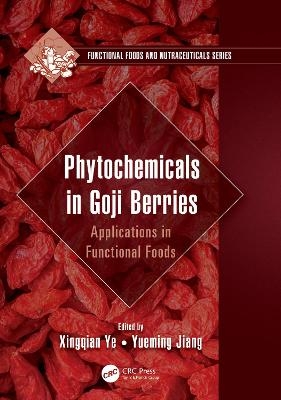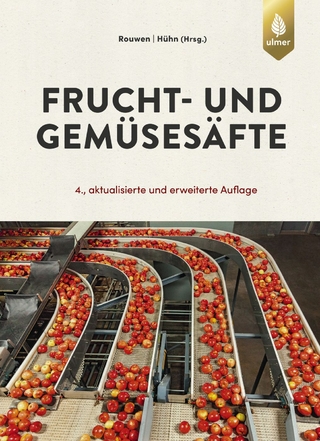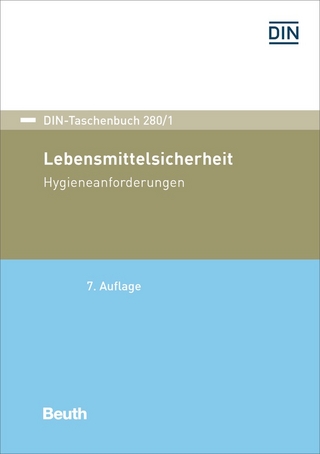
Phytochemicals in Goji Berries
CRC Press (Verlag)
978-0-367-07634-4 (ISBN)
- Titel z.Zt. nicht lieferbar
- Versandkostenfrei innerhalb Deutschlands
- Auch auf Rechnung
- Verfügbarkeit in der Filiale vor Ort prüfen
- Artikel merken
Goji berries (Lycium barbarum), which are widely distributed in Northwestern China, Southeastern Europe and the Mediterranean areas, have traditionally been employed in Chinese medicine from ancient times. Goji berries, also known as wolfberry, have become increasingly popular in the Western world because of their nutritional properties, often advertised as a superfood in Europe and North America.
With the development of analysis methods, various chemical constituents have been identified, including carbohydrates, carotenoids, flavonoids, betaine, cerebroside, -sitosterol, amino acids, trace elements, vitamins and other constituents. Polysaccharides have been identified as one of the major active ingredients responsible for biological activities.
Phytochemicals in Goji Berries: Applications in Functional Foods, a volume in the Functional Foods and Nutraceuticals Series, provides information about the chemical, biochemical, botanic properties, bioactive components and health benefits of Goji berries. It also discusses postharvest storage technology, processing technology, and the development and utilization of Goji berry by-products in medicinal foods and functional foods, as well as addressing food safety issues.
Features:
Provide information on Goji fruit origin and growing conditions, distribution, and biochemical properties
Discusses such medicinal properties and health benefits of Goji berries as the capacity to lower blood pressure, treat anemia, maintain cholesterol levels in the normal range and decrease risk of cardiovascular disease. Additionally, Goji berries have anti-inflammatory and anti-tumor properties, among others
Includes information on traditional products, new products and innovative processing technologies
This book will serve college and university students majoring in food science, nutrition, pharmaceutical science, and botanical science. It also will serve as a unique reference for food science professionals pursuing functional foods, marketing expansion, as well as nutritional dietary management. Readers will obtain sound scientific knowledge of the nutritional value and health benefits of the different Goji berry products such as juice, cake, soup, snacks, and medicinal foods.
Also available in the Functional Foods and Nutraceuticals series:
Korean Functional Foods: Composition, Processing and Health Benefits, edited by Kun-Young Park, Dae Young Kwon, Ki Won Lee, Sunmin Park (ISBN 978-1-4987-9965-2)
Phytochemicals in Citrus: Applications in Functional Foods, edited by Xingqian Ye (ISBN 978-1-4987-4272-6)
Food as Medicine: Functional Food Plants of Africa, by Maurice M. Iwu (ISBN 978-1-4987-0609-4)
For a complete list of books in the series, please visit our website at https://www.crcpress.com/Functional-Foods-and-Nutraceuticals/book-series/CRCFUNFOONUT
Dr. Xingqian Ye is a Professor in the Department of Food Science and Nutrition, Deputy Dean of College of Biosystems and Food Science at the Zhejiang University. Dr. Ye received his Ph.D. degree in Agriculture Products Storage and Processing from Zhejiang Agricultural University. He also conducted collaborative research in Bulgaria, Canada, USA, and Greece. His research focuses on the fruit and vegetable processing technology, nutraceuticals and functional foods from fruit and vegetable. Recently he studies the processing and comprehensive utilization of Chinese bayberry, mandarin and other local fruits and vegetables, especially on the identification and separation of phytochemicals from fruits. He meanwhile is working on the development of mixing fruit and vegetable products, including fruits, nuts and cereals to enhance the antioxidant capacity after mixing and processing. Dr Ye also studied the stability of flavonoids including flavnone and phenolic acids after treatment of ultrasonic. Dr. Ye has published more than 250 research papers in refereed scientific journals, along with 16 book chapters, 40 Chinese patents, and a number of invited presentations. Dr Ye has edited books "Bioactive Compounds in Citrus" in 2017, and "Chinese Dates, A Traditional Functional Foods" published by CRC Press in 2016. He has also edited 4 books and a text book on fruit and vegetable processing in Chinese (from 2 edit to 4th edit). He received several other scholarly awards including the 3 second place of Science and Technology Awards from Zhejiang Provincial Government. Dr Ye was Guest Editor of LWT-Food Science and Technology for the special issue of "Food Innovation in China" in 2014. Dr Ye is Associate Editor of Journal " Food Quality and Safety"(FQS) published by Oxford University Press (OUP), and Editorial Board Member of Journal of Food Engineering, Journal of Chinese Institute of Food Science and Technology and other 4 Chinese journals. Dr. Yueming Jiang is the deputy director of South China Botanic Garden (formerly known as South China institute of Botany, the Chinese Academy of Sciences. Professor Jiang has also been appointed as the vice-president of Chinese Society for Plant Physiology, president of Guangdong Society for Plant Physiology, vice-president of Guangzhou Association for International Academic Exchange and Cooperation, and scientific advisor to the International Foundation for Science. Dr Jiang received his PhD in 1999 from Zhongshan University. His research focuses on the postharvest biology and technology of fruits and vegetables, and functional food development from plant natural resource. Professor Jiang has published more than 550 peer-reviewed research papers in primary journals with high "SCI Impact Factor", about 50 review papers in Trends in Biotechnology, Trends in Endocrinology and Metabolism, Critical Reviews in Food Science and Nutrition, Trends in Food Science & Technology, 35 book chapters. He was a guest editor of the Stewart Postharvest Review, associate editor of Plant Physiology Journal, Journal of Tropical and Subtropical Botany, and Journal of Tropical Crop, and editorial member of Food Research International, Postharvest Biology and Technology, Journal of Food, Agriculture and Environment, Journal of Applied Horticulture, and Acta Horticultueae Sinica. Dr. Jiang received the IFS Jubilee Award in 2002, the Science and Technology Awards from China General Chamber of Commerce in 2005, 2007 and 2015, the National Science and technology Advance Award in 2008, the Science and Technology Awards from Guangdong Province in 2009 and 2016, the Outstanding Research Talent Award for Innovation and Development of China’s Food Industry in 2011, the National Technological Invention Award in 2013, and the Science and Technology Award from Hainan Province in 2018.
PART I: Chemical, Biochemical and Botanic Properties of Lycium Barbarum (Goji) Berries, and Production in the World. Lycium Barbarum (Goji) Berries in Ningxia: History, Production, Composition and Health Effects and as Traditional Medical Foods. Variation in Fruit Sugar Composition of Lycium Barbarum (Goji) of Different Regions and Varieties. Lycium Barbarum Berry (Goji) Studies: Molecular Biology, Phytochemistry and Pharmacology. Lycium Barbarum (Goji) Berry Fruits: Antioxidant Compound Fingerprint and Bioactivity Evaluation. Botanical Characteristics, Phytochemistry, Clinical Relevance in Efficacy and Safety of Lycium Barbarum Berries (Goji). Phytochemical Analysis and Antioxidant Activity of Lycium Barbarum (Goji) Cultivated in Greece. Bioactive Compounds and Antioxidant Properties of Goji Fruits (Lycium Barbarum) Cultivated in Serbia. Lycium Barbarum Polysaccharides: Extraction, Purification, Structural Characterisation and Evidence about Hypoglycaemic and Hypolipidaemic Effects. Protective Effect Of Lycium Barbarum on Doxorubicin-Induced Cardiotoxicity. Lycium Barbarum (Goji) Juice Improves in Vivo Antioxidant Biomarkers in Serum of Healthy Adults. PART II: Bioactive Components and Health Benefits. Polyphenols from Lycium Barbarum (Goji) and their Bioactivities. Biological Activities and Potential Health Benefit Effects of Polysaccharides Isolated from Lycium Barbarum. Effect of the Lycium Barbarum Polysaccharides Administration on Blood Lipid Metabolism and Oxidative Stress of Mice Fed High-Fat Diet in Vivo. Hypoglycemic and Hypolipidemic Effects and Antioxidant Activity of Fruit Extracts from Lycium Barbarum. Lycium Barbarum Glycoconjugates: Effect on Human Skin and Cultured Dermal Fibroblasts. Lycium Barbarum Polysaccharides Regulate Phenotypic and Functional Maturation of Murine Dendritic Cells. The Pharmacological Activities and Possible Molecular Targets of Lycium Barbarum Polysaccharides. Lycium Barbarum Polysaccharide Inhibits the Proliferation of Hela Cells by Inducing Apoptosis. Effect of Lycium Barbarum Berries (Goji) on Expression of Genes Related to Cell Survival. Effects of Lycium Barbarum Polysaccharides Against Cadmium Induced Damage in Testis. Ultrastructural Deposition Forms and Bioaccessibility of Carotenoids and Carotenoid Esters from Lycium Barbarum Berries (Goji). Isolation of Carotenoids, Flavonoids and Polysaccharides from Lycium Barbarum L. and Evaluation of Antioxidant Activity. Polyphenols from Lycium Barbarum(Goji) and their Bioactivities. Three New Dimers and Two Monomers of Phenolic Amides from the Fruits of Lycium Barbarum Berries and their Antioxidant Activities. Comparative Studies on Phenolic Profiles, Antioxidant Capacities and Carotenoid Contents of Red Goji Berry (Lycium Barbarum) and Black Goji Berry (Lycium Ruthenicum). PART III: Postharvest Storage Technology. Treatments with High CO2 and Low O2 Concentrations on Quality of Fresh Lycium Barbarum (Goji) Berries During Cold Storage. Effects of Postharvest Application of Lecithin to Improve Storage Potential and Quality of Fresh Lycium Barbarum (Goji) Berries. PART IV: Innovative Processing Technology Development. Effects of Superfine Grinding on Physicochemical and Antioxidant Properties of Lycium Barbarum Polysaccharides. Effect of Drying Methods on Physicochemical Properties and Antioxidant Activities of Lycium Barbarum Berries (Goji) Polysaccharide. Application of Osmotic Dehydration to Improve the Quality of Dried Goji Berry. Far-Infrared Radiation Heating Assisted Pulsed-Vacuum Drying (FIR-PVD) of Lycium Barbarum Berries (Goji). Effect of a Physical Pre-Treatment and Drying on Carotenoids of Lycium Barbarum (Goji) Berries. Chemical Properties and Bioactivities of Lycium Barbarum(Goji) Polysaccharides Extracted by Different Methods. Ultrasound-Enhanced Subcritical Water Extraction of Polysaccharides from Lycium Barbarum. Supercritical CO2 Anti-Solvent Purification of Anti-Oxidative Compounds from Lycium Barbarum Berries. Microwave-Assisted Extraction in Lycium Barbarum Berries: Effect on Composition and Bioactivity, Evaluated through Conventional and Nonconventional Methodologies. Lycium Barbarum Polysaccharides: Extraction, Purification, Structural Characterisation and Evidence about Hypoglycaemic and Hypolipidaemic Effects. Ultrasound-Enhanced Subcritical Water Extraction of Polysaccharides from Lycium Barbarum. PART V: Utilization of Lycium Barbarum(Goji) By-Products. Isolation, Structural Characterization, and Antioxidativity of Polysaccharide LBLP5-A from Lycium Barbarum Leaves. Functional Constituents of Wild and Cultivated Goji (L. Barbarum L.) Leaves: Phytochemical Characterization, Biological Profile, and Computational Studies. Chemical Composition of Lycium Barbarum Berry Oil Obtained by Supercritical CO2 Extraction and Evaluation of its Antioxidant Activity, Cytotoxicity and Cell Absorption. Polysaccharides from Lycium Barbarum Leaves: Isolation, Characterization and Splenocyte Proliferation Activity. PART VI: Medicated Foods, Functional Foods of Lycium Barbarum (Goji) Berries. Collections of Traditional Chinese Medicated Foods. PART VII: Food Safety of Lycium Barbarum (Goji) Berry Products. Lycium Barbarum (Goji) Berries: Phytochemistry, Pharmacology and Safety in the Perspective of Traditional Uses and Recent Popularity. Recently Introduced Foods as New Allergenic Sources: Sensitisation to Lycium Barbarum Berries (Goji).
| Erscheinungsdatum | 02.07.2020 |
|---|---|
| Reihe/Serie | Functional Foods and Nutraceuticals |
| Zusatzinfo | 55 Illustrations, color; 25 Illustrations, black and white |
| Verlagsort | London |
| Sprache | englisch |
| Maße | 178 x 254 mm |
| Gewicht | 1320 g |
| Themenwelt | Technik ► Lebensmitteltechnologie |
| ISBN-10 | 0-367-07634-9 / 0367076349 |
| ISBN-13 | 978-0-367-07634-4 / 9780367076344 |
| Zustand | Neuware |
| Informationen gemäß Produktsicherheitsverordnung (GPSR) | |
| Haben Sie eine Frage zum Produkt? |
aus dem Bereich


